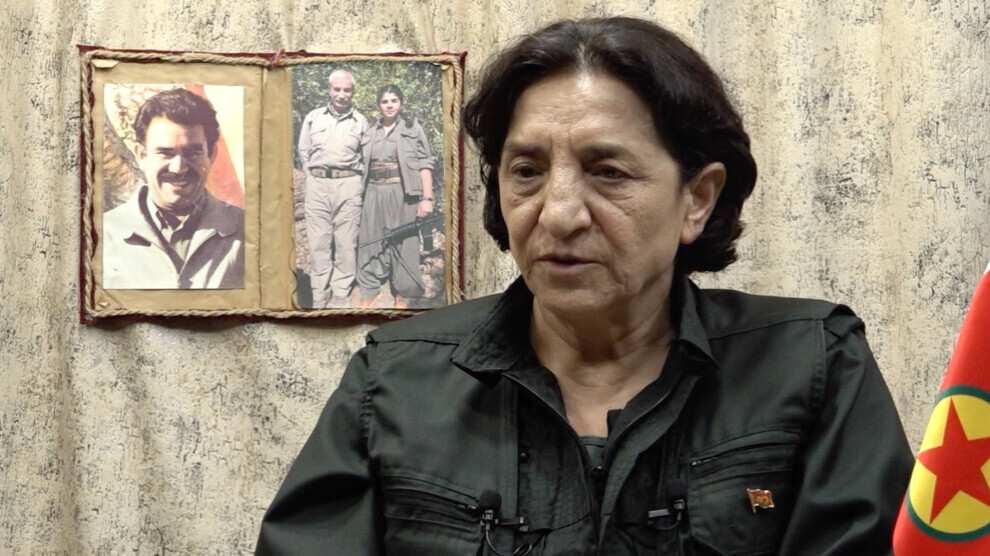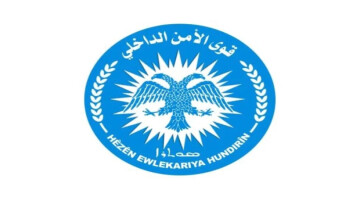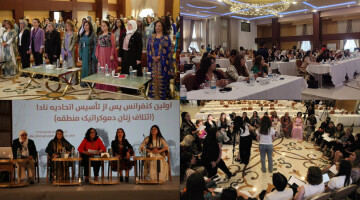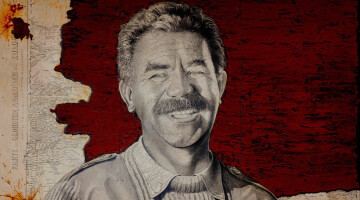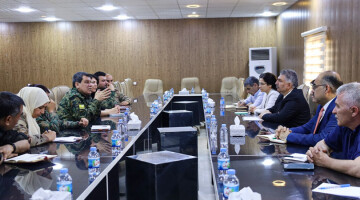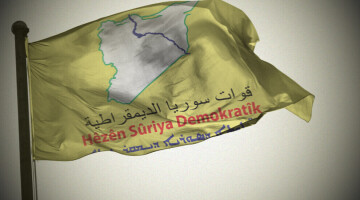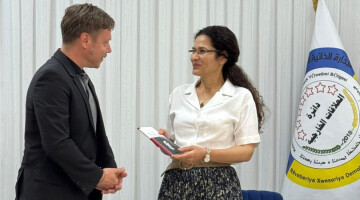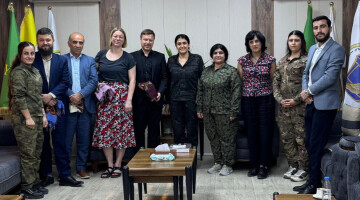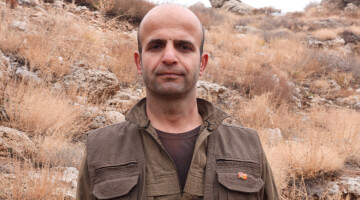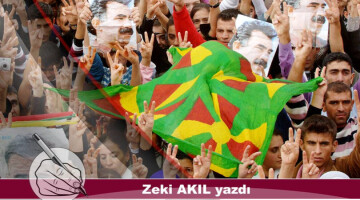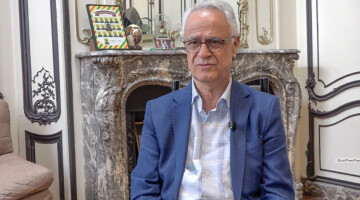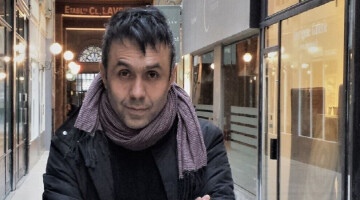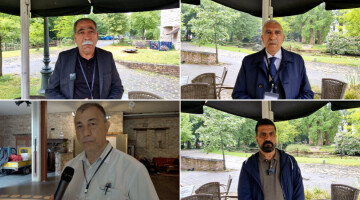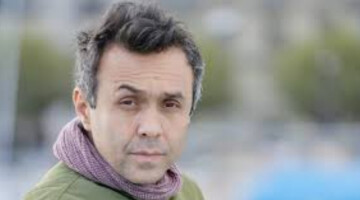Sozdar Avesta, member of the Presidential Council of the KCK, made an important speech on the 10th anniversary of the Yazidi genocide carried out by the Islamic State on 3 August 2014.
Here are excerpts of the speech made by Avesta.
"3 August marks the 10th anniversary of the 74th ferman against the Êzidi (Yazidi) population in Shengal (Sinjar). First and foremost, I condemn with hatred the massacring forces involved in this ferman, as well as the collaborators who were complicit in it. At the same time, I respectfully commemorate all of those who lost their lives in the 74th ferman, as well as the resistance fighters, comrades Dilsher Herekol, Egid Civiyan, Nujin Sert, Nergis, Dilgesh Rojhilat, Genco Hewler, and Evin Derik, who responded to the Êzidi cry for help and thus prevented the genocide at the cost of their lives.
I honor the martyrs of freedom and the Êzidi people, including Zeki Shengali, Mam of Êzidxan, comrades Beshir, Said, Berxwedan, Zerdesht, Azad, and Dijwar Feqir, the commander of Shengal. I cherish their memories. On this particular occasion, I appreciate Rêber Apo’s resistance. The 74th ferman of the Êzidi people was only prevented by the militants fighting under Rêber Apo’s perspective.
In what period did this ferman take place? Which forces took part in it? What were the goals and objectives, and how much of each was achieved? Of course, for ten years, these questions have been analyzed from countless perspectives, but there are still things that are unclear. We believe that the honorable resistance of our people will bring to light what still remains in the dark and hold these massacring forces to account.
Today, despite all the impossibilities, our Êzidi people, who rose from their ashes with their faith and resistance, are still continuing their struggle. I sincerely greet the mothers of the martyrs, the women of the resistance, the youth who have played their role in every period, YBŞ, YJŞ, the Êzidxan asayish, and all our people, and I offer my respect and esteem. I congratulate them on their struggle. This honorable resistance prevented the ferman from achieving its goal.
Before Mosul fell into the hands of the ISIS gangs, the forces that founded ISIS held a meeting on June 1, 2014, in Amman, the capital of Jordan. Saudi Arabia, Qatar, the fascist Turkish state, and their collaborators – the treasonous Barzani family and its KDP – were present at this meeting. According to the decisions taken in Amman, the line from Shengal to Mosul, Derik, and a large part of Qamishlo were to be handed over to ISIS. They officially discussed this decision among themselves and had reached an agreement. All public opinion knows this. In the spring of 2014, the Barzani family dug a trench between Rojava and southern Kurdistan on the occupation border. This was the beginning of the ‘Amman plan’. On the one hand, they aimed to subjugate the Êzidi people and eliminate their beliefs, and on the other hand, they aimed to suffocate the new Rojava Revolution. Those who betrayed these people have been continuing this betrayal for ten years.
It is known that the Êzidi community had the opportunity to be free after the fall of Saddam’s dictatorship in Iraq in 2003. They were awaiting the day when they would live freely in their own land. Accordingly, in 2004, they started to organize under the leadership of comrade Seyid Hesen based on the ideas and thoughts of Rêber Apo. Until 2014, the Barzani family was in charge of Shengal and prevented the Êzidi community from organizing of its own volition. The last two fermans of the Êzidi community in 2007 and 2014 took place during the Barzani family’s rule. It was they who prevented the Êzidi community from organizing, forming their own defense forces, and governing themselves. Therefore, they didn’t hesitate to arrest members of this movement on a daily basis, put obstacles in their way, did not allow them to do as little as distributing leaflets, and prevented them from raising public awareness. Again, when the danger to Shengal increased, our movement wanted to prevent this and intervene there. For this, a group of guerrillas was sent to Shengal under the leadership of Dilsher Herekol. It was shortly before the ferman and the KDP arrested some of these friends and threw them into prison. On August 3, when the ISIS attacks started, as is known, the KDP left the people in the hands of the gangs and fled. They collected the weapons of the people, obstructed them, turned their backs on the people, and fled dishonorably.
The KDP still continues this policy. Neither the Iraqi state nor the Barzani family defended the Êzidi community. It has been ten years since the ferman, and in these ten years, the attacks continued on a daily basis. In fact, the efforts to complete the ferman still continue today. There were martyrs in the attacks on Xanesor, and every day the Turkish state attacks with airplanes and attempts assassinations. The attacks to expel the Êzidi community from their lands still continue, as does the resistance against them. The attacks of the fascist Turkish state and the betrayal of the Barzani family have caused more loss of life than war against ISIS. The heroes of Êzidxan, such as the comrades Seyid, Dijwar, Zerdesht, Berxwedan, Azad, Dildar, Hayri, Berivan, and Arin, were targeted because they stood against betrayal. I would like to take this opportunity to dwell a little on the efforts and work of these friends.
Comrade Seyid went to the mountains of Shengal with his family, his tribe, and all the people around him, even if no one would have followed him, and even if everyone had left, he still would have resisted. “I will resist with the strength I get from Rêber Apo; I will not run away!” is what he said. Many members of comrade Dijwar Feqirs tribe at that time were KDP Peshmerga. They wanted him to leave Shengal, but comrade Dijwar said that he would stand by the freedom fighters until his last breath. All of the tribes and our people who remained on Mount Shengal played a historic role. As the freedom movement, we knew very well that if the people had left Shengal, they would never return. The Barzani family did everything to evacuate Shengal. Especially in the first months, the KDP closed the corridor between Rojava and Shengal, which dozens of people gave their lives to open, and they blockaded Shengal so that the people would leave their lands. Those who stayed in Shengal at that time, under the leadership of Seyid and Dijwar, resolutely said, “We will eat soil if necessary; we will go hungry and thirsty, but we will not leave Shengal.” Seeing this approach, one does understand much better how appropriate that decision to resist was. The Êzidi people saw this; the whole world saw this. Taking this decision at such a time, laid the foundation for many things. Our people should understand this very well and not fall for anyone’s deceptions. They need to research on what basis the struggle that has been waged until today has been realized. For example, these friends were targeted because they did not submit to the Barzani family because they took a clear stance. The Barzani family closed the door opened by the freedom movement less than two months after the ferman, and on the 12th month, they made a show with their convoy and headed to the mountains of Shengal. Comrade Seyid confronted them and said, “How dare you still come here? Our honor and dignity were attacked; you caused this. How do you still have the face to return?” Everyone knew that comrade Seyid would become a target because of his honorable upright stance. The KDP made dozens of plans to murder comrade Seyid.
After ten years of resistance and struggle, both Shengal and its surroundings were liberated, and the people established their defense forces. These YBŞ, YJŞ, and Êzidxan asayish forces resisted with great will in these ten years. Of course, it was the freedom fighters from the mountains of Kurdistan, such as Dilsher and Egid, who brought them to this point and created such a strong will, power, and level of organization. Thanks to the YJA Star, HPG, YPG, and YPJ, they reached this level. International states maybe don’t talk about it much because of their self-interests, but back then, everyone saw how those forces intervened from four sides. Accordingly, the Iraqi Prime Minister Haider Abadi congratulated and thanked the freedom movement.
Although ten years have passed since then, the wounds of Shengal are still not fully healed, and the fate of thousands of people, especially women, children, and young people, is still unclear. All parts of society have a great duty to avenge these people. The autonomous administration has been governing society in Shengal for ten years from the perspective of a democratic nation, despite all the obstacles. It has been protecting Shengal, practicing self-governance, meeting the needs of the people, and waging a struggle. They have carried out very valuable work in recent days. They organized the third Iraqi Women’s Conference in Baghdad. They also organized a workshop on freedom and justice in Shengal. Our people have now overcome the period of victimization. They can now govern themselves and hold themselves accountable. They were subjected to great suffering by the occupying forces for a period of time, but now it is time to hold them to account. In other words, the most valuable response to the ferman is to make self-government inevitable, which will avenge the martyrs and stop further victimization. Our community now sees this very well, if they do not govern themselves, if they cannot defend themselves, no one will support them. That’s why it is so important to protect self-governance and fight for it in all areas. This is so that the Êzidi community will never face fermans again.
On this occasion, we once again call on the Iraqi state. Iraq is a rich country: all societies, beliefs, and cultures are vivid in it. Therefore, leaving the Êzidi people defenseless, without will and identity, is not a success for Iraq. On the contrary, it is something that will hurt Iraqi sovereignty. Some of the decisions taken as a result of blackmail by the Turkish state and the Barzani family are not in Iraq’s interests. The Êzidi community has never harmed the Iraqi state and never will. They have stayed in their lands despite all the attacks; they have not attacked anyone in any way, nor do they intend to attack anyone. Iraq should not succumb to the blackmail of the Barzani family, and it should never fall for the games of the Turkish state. It is a very shameful and dishonorable situation for the Iraqi state to massacre a community that has survived so many fermans on Iraqi soil. What needs to be done is for the Iraqi state to recognize the status of Shengal constitutionally, following the example of South Kurdistan.
The Êzidi community should not be treated as a bargaining chip between Iraq and the Barzani family. In recent times, new political games have been played. We are no strangers to these. In Armenia and Germany, for decades, they debated whether Êzidis were Kurds or not. They want to develop the same thing in Iraq. This discussion is not the agenda of the Êzidi community. The Iraqi government should put aside the October 9th treaty, not put it into effect, reject it, and make a joint agreement with the Êzidi authorities in Shengal. Such an approach would be an apology for their failure to fulfill their duties during the ferman. The way to repay their debt to Shengal is to recognize the status of Shengal and make democratic peace with this community. Our people, both in Shengal and abroad, have an agenda. No one, especially our Êzidi people, should deceive themselves and say that the ferman is over.
Yet again, the Turkish state is deploying ISIS mercenaries in South Kurdistan. They were firstly brought to the Berwari Bara area under the leadership of the Barzani family, and now South Kurdistan is under the occupation of the Turkish state. There is a great resistance against this, but the danger of genocide still continues. Our people should be well aware of this situation. On the one hand they should increase their struggle, on the other hand they should strengthen their self-defense. Women have been on the streets for ten years. They are leading this great resistance, following the footsteps of comrade Berivan and Naze, and not giving in to oppression despite going through so many fermans. They have given hope to all oppressed peoples. Mothers and women have taken the lead. They organized themselves in line with Rêber Apo’s philosophy and tasted freedom. Very important work is being done on the basis of Rêber Apo’s philosophy.
The KDP had sown seeds of discord in society; people would not even eat from each other’s hands. But now, Êzidi, Arab, Turkmen, Assyrian, and Iraqi women are fighting side by side. This is thanks to Rêber Apo’s philosophy, which developed the women’s liberation struggle. Today, the women of Shengal are leading this struggle and growing the resistance. This is very important. I strongly believe that the Êzidi youth, who follow Rêber Apo’s philosophy and have raised the struggle following comrades Berivan and Naze, will also lead this process. People from many different faiths have martyred for Shengal. The martyrdom of our Alevi people, Arab people, international friends, and those who defend the Kurdish identity, those who saw their lives under attack in Shengal, formed the basis of democratic autonomous Shengal. I would like to take this opportunity to address our Êzidi community abroad and our people that are scattered all over Europe and America; your community is under threat. The only correct answer is to organize and unite. The true unity of the people of Shengal, isolating the betrayers, must be established.
Our people of Shengal are no longer like they were a few years ago. They have power, they are conscious, they have hope, they know the ways and methods of struggle, and they can distinguish who is a friend and who is a foe. We always say that great suffering brings about great breakthroughs. Everyone should know that this ferman was the last ferman. I say it once again: if our people establish their unity with their resistance, struggle, and the ideas of Rêber Apo, if they institutionalize their autonomy, no power can attack them anymore. No one should deceive themselves, saying that they have lived through 73 fermans and that no other danger will come across their way. In the ongoing World War III, capitalist modernity and hegemonic powers are swallowing countries. They are definitely ready to sacrifice a handful of Shengalis for their self-interests. Just as they sacrificed them ten years ago, they will sacrifice them now. We are living in such a process that language, culture, and personality are not important to the forces of self-interest. In order for the risk of complete annihilation to be nullified, resistance and struggle must be embraced more. I point out once again that we are grateful to the martyrs, to Rêber Apo, and to our people who took part in the resistance and returned to their lands. After ten years, the Êzidis are returning to their lands. On this occasion, I call on all people of honor, dignity, and devotion to their land to return to Êzidxan."

